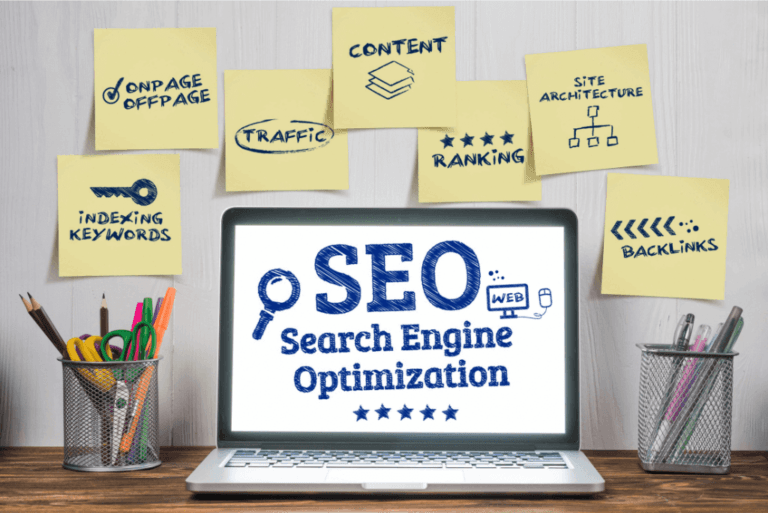Introduction
When it comes to improving a website’s visibility on search engines, On-Page vs. Off-Page SEO plays a crucial role. Both are essential for ranking higher on Google, but they focus on different aspects of optimization.
On-Page SEO techniques involve optimizing elements within your website, such as high-quality content, keyword placement, meta tags, and internal linking. This ensures that search engines understand your pages and rank them accordingly. On the other hand, Off-Page SEO strategies focus on activities outside your website, such as building backlinks, social media marketing, and brand mentions, to boost credibility and authority.
To achieve the best results, both SEO ranking factors must work together. While SEO content optimization enhances the relevance and readability of your site, off-page efforts help establish trust and influence. Understanding the difference between On-Page vs. Off-Page SEO will help you create a well-rounded SEO strategy for better rankings and increased organic traffic.
What is On-Page SEO?
Search Engine Optimization (SEO) is the key to increasing website visibility on search engines like Google. It is divided into two major categories: On-Page vs. Off-Page SEO. On-Page SEO focuses on optimizing elements within a website, while Off-Page SEO deals with external factors like backlinks and social media. This article will explore On-Page SEO techniques, how they affect SEO ranking factors, and the importance of SEO content optimization for better search rankings.
Understanding On-Page SEO
On-Page SEO refers to all the actions taken within a website to improve its search engine rankings. It includes optimizing content, improving website structure, and enhancing user experience. Effective On-Page SEO techniques ensure that search engines understand your content, making it easier to rank higher.
Why is On-Page SEO Important?
On-Page SEO is crucial because it directly impacts how search engines and users interact with your website. Well-optimized pages improve rankings, increase traffic, and enhance user experience. Unlike Off-Page SEO strategies, which rely on external factors, On-Page SEO gives website owners complete control over their optimization efforts.
Key On-Page SEO Techniques
To improve SEO ranking factors, websites must implement strong On-Page SEO techniques. These include:
1. SEO Content Optimization
Content is the backbone of any website. SEO content optimization ensures that content is relevant, engaging, and valuable to users. Important aspects include:
Keyword Optimization – Using targeted keywords naturally throughout the content.
High-Quality Content – Creating well-researched, informative, and engaging articles.
Content Structure – Using headings (H1, H2, H3) to improve readability.
Internal Linking – Connecting related pages within the website.

2. Title Tags & Meta Descriptions
Title tags and meta descriptions help search engines understand the page’s content. Best practices include:
Using Primary Keywords in the title tag.
Keeping Titles Concise (50-60 characters).
Writing Engaging Meta Descriptions (150-160 characters).
3. URL Structure Optimization
SEO-friendly URLs improve rankings and user experience. Ideal URLs:
Are short and descriptive.
Include relevant keywords.
Avoid unnecessary characters or numbers.
4. Image Optimization
Images enhance user experience, but they must be optimized for SEO. Techniques include:
Using Descriptive Alt Text for search engines.
Compressing Images for faster page loading.
Using Proper File Names with relevant keywords.
5. Mobile-Friendliness
Google prioritizes mobile-friendly websites. To ensure mobile optimization:
Use responsive design.
Optimize images and fonts for mobile screens.
Ensure fast loading speeds.
6. Page Speed Optimization
Fast-loading websites improve user experience and search rankings. Speed optimization involves:
Using a Content Delivery Network (CDN).
Optimizing Images and Videos.
Minimizing HTTP Requests.
Enabling Browser Caching.

How On-Page SEO Affects Rankings
Google uses SEO ranking factors to determine a website’s position in search results. On-Page SEO techniques contribute to:
Improved Search Engine Crawling – Proper optimization helps search engines index content efficiently.
Higher User Engagement – Well-structured pages keep visitors engaged longer.
Lower Bounce Rates – Fast-loading, mobile-friendly pages reduce bounce rates.
Better Keyword Relevance – Proper keyword placement improves ranking chances.
Best Practices for On-Page SEO
To maximize results, follow these On-Page SEO techniques:
Write User-Centric Content – Prioritize user intent over keyword stuffing.
Optimize for Voice Search – Use natural language for search queries.
Improve Readability – Use short sentences and paragraphs.
Use Schema Markup – Enhance search appearance with structured data.
Update Content Regularly – Keep content fresh and relevant.
On-Page SEO is a critical aspect of website optimization, helping search engines understand and rank your pages. By implementing effective On-Page SEO techniques, improving SEO content optimization, and focusing on SEO ranking factors, you can enhance website visibility and attract more visitors. While Off-Page SEO strategies support rankings through backlinks and social media, a well-optimized website ensures long-term success. For the best results, focus on both On-Page vs. Off-Page SEO to create a strong, well-rounded SEO strategy
What is Off-Page SEO?
When it comes to improving your website’s visibility on search engines like Google, SEO (Search Engine Optimization) is crucial. SEO can be divided into two main areas: On-Page SEO and Off-Page SEO. While On-Page SEO refers to the tactics you use on your website itself to improve rankings, Off-Page SEO focuses on actions taken outside of your website to impact your site’s performance in search engine rankings. In this article, we’ll explore Off-Page SEO, compare it with On-Page SEO, and provide you with actionable Off-Page SEO strategies to boost your site’s authority and ranking.
Off-Page SEO strategies refers to all the actions you take outside your website to improve its position in search engine rankings. It includes building backlinks, social media marketing, guest blogging, influencer marketing, and other external efforts to increase your site’s credibility and trustworthiness. The primary goal of Off-Page SEO strategies is to increase your website’s authority in the eyes of search engines, which ultimately helps you rank higher in search results.
When search engines evaluate your website, they take into account factors like backlinks, social media signals, and the reputation of your website. High-quality Off-Page SEO strategies techniques signal to search engines that your content is valuable, trusted, and relevant to users.
What is Off-Page SEO?
Before jumping into Off-Page SEO strategies, let’s On-Page SEO techniques techniques that you should apply to your website:
Title Tags and Meta Descriptions: These HTML elements give search engines a snapshot of your page’s content. Use relevant keywords and compelling language to encourage users to click through.
Content Optimization: Your website content must be well-structured, engaging, and keyword-rich. Make sure to include your target keywords naturally throughout the content without keyword stuffing.
Internal Linking: Linking to other pages within your website helps search engines crawl and index your site more effectively. It also keeps users on your site longer.
Mobile Optimization: With mobile traffic growing, ensuring your website is responsive and mobile-friendly is essential for good SEO performance.
Page Load Speed: A slow website can hurt your SEO ranking. Improve your page load speed to enhance user experience and rankings.
These On-Page SEO techniques techniques work hand-in-hand with Off-Page SEO strategies to improve your site’s overall search visibility.
Off-Page SEO Strategies
Now, let’s dive into the core Off-Page SEO strategies that can help improve your website’s authority and rankings.
1. Backlink Building
One of the most important off-page SEO strategies to raise the authority and SEO performance of your website is backlink development. Search engines are informed that your material is valuable by backlinks, which are endorsements from other websites. This has a direct effect on SEO ranking factors, which helps to improve the position of your website on search engine results pages (SERPs).
Prioritizing high-quality backlinks from reliable sources in your industry is crucial for optimizing backlink building’s efficacy. This aligns with both On-Page vs. Off-Page SEO efforts, as On-Page SEO techniques like content optimization play a role in attracting backlinks. It is simpler for people to link back to your website when your content is optimized.
Importance: Backlink building is crucial for Off-Page SEO strategies. Quality backlinks improve your website’s authority and SEO ranking.
SEO Ranking Factors: Backlinks are one of the strongest SEO ranking factors, helping your site rank higher in search results.
On-Page vs. Off-Page SEO: While On-Page SEO techniques focus on content, Off-Page SEO strategies like backlinks boosts your site’s credibility externally.
Content Optimization: SEO content optimization makes your site more likely to attract high-quality backlinks from other reputable websites.
Effective Strategies: Use guest blogging, broken link building, and influencer outreach to acquire valuable backlinks.
Outcome: A strong backlink profile enhances your site’s SEO performance, increasing visibility and organic traffic.
2. Social Media Marketing
While social media signals are not a direct ranking factor, social media marketing can significantly impact your Off-Page SEO strategies efforts. Sharing your content on platforms like Facebook, Twitter, LinkedIn, and Instagram can drive traffic to your website and increase visibility. Social sharing also encourages others to link to your content, indirectly improving your SEO ranking factors.
Incorporate social sharing buttons on your website to make it easier for users to share your content. Engage with your audience through comments and messages, as this helps build a loyal following and strengthens your online presence.

3. Influencer Marketing
Influencer marketing involves collaborating with influential figures in your industry to promote your content. By partnering with influencers, you can tap into their established audience, driving more traffic and increasing brand credibility. When an influencer shares your content or mentions your website, it can result in valuable backlinks and social signals that improve your SEO ranking factors.

4. Online Reputation Management
Your website’s reputation plays a significant role in Off-Page SEO strategies. Positive reviews and testimonials from satisfied customers or clients can improve your website’s trustworthiness and authority. Conversely, negative reviews or mentions can hurt your SEO ranking factors. Encourage happy customers to leave reviews on platforms like Google My Business, Yelp, and Trustpilot.
5. Forum and Q&A Participation
Participating in online forums and Q&A sites like Quora, Reddit, or niche-specific communities can also help with Off-Page SEO strategies. Answer questions and contribute to discussions while subtly linking to relevant content on your website. This not only drives traffic but also improves your website’s visibility in search engine results.
6. Content Marketing and PR
Creating valuable, shareable content is a powerful way to boost your Off-Page SEO strategies. When your content is widely shared, it generates backlinks, social signals, and increased website traffic. Try these strategies:
Guest Posts: As mentioned earlier, writing guest posts on authoritative websites within your industry can result in valuable backlinks and exposure.
Press Releases: Announce new products, services, or partnerships through press releases that can be picked up by news outlets or industry websites.
Infographics: Create visually appealing infographics that others can share and link to.

SEO Ranking Factors
Both On-Page SEO techniques and Off-Page SEO strategies factors contribute to your website’s overall SEO ranking factors. Here are the key SEO ranking factors that impact your website’s performance:
- Backlinks: The quantity and quality of backlinks are one of the most important ranking factors.
- Content Quality: High-quality, original content that answers user queries will rank better.
- User Experience: Sites with a good user experience, fast load times, and mobile optimization tend to rank higher.
- Technical SEO: Proper technical SEO, such as clean code and structured data, is crucial for good rankings.
- Social Signals: While not a direct ranking factor, social media engagement can lead to higher traffic and more backlinks.
- Domain Authority: A website’s overall authority, determined by its backlink profile, is a key ranking factor.
SEO Content Optimization
Content optimization is crucial for both On-Page SEO techniques and Off-Page SEO strategies. By creating high-quality, keyword-optimized content, you increase your chances of ranking higher in search results. Here are some tips for SEO content optimization:
- Keyword Research: Use keyword research tools to identify the best keywords for your content.
- Content Length: Longer content tends to perform better in search engines, but make sure it remains valuable and engaging.
- Use of Multimedia: Incorporate images, videos, and infographics to enhance user engagement.
- Internal Linking: Link to other relevant pages on your website to boost SEO
On-Page vs. Off-Page SEO: Key Differences
| Feature | On-Page SEO | Off-Page SEO |
|---|---|---|
| Control | Fully controlled by website owner | Influenced by external factors |
| Focus | Content, structure, and UX | Link building, social engagement, brand mentions |
| Ranking Factors | Keywords, meta tags, page speed | Backlinks, social signals, domain authority |
| Impact | Immediate and direct | Takes time to show results |
| Examples | Title tags, internal links, mobile optimization | Guest blogging, influencer marketing, social media sharing |
Why You Need Both On-Page and Off-Page SEO
In the ever-evolving world of digital marketing, Search Engine Optimization (SEO) remains one of the most crucial strategies for boosting your website’s visibility and driving traffic. While SEO is a broad topic, it can be generally divided into two categories: On-Page SEO and Off-Page SEO. Each plays an essential role in ensuring that your website ranks higher on search engine results pages (SERPs). To achieve optimal SEO performance, you need to implement both On-Page SEO techniques and Off-Page SEO strategies. Understanding the differences between the two, and why both are necessary, can help you create a comprehensive SEO strategy that delivers consistent results.
1. On-Page SEO: Laying the Foundation
On-Page SEO is the first step toward making your website visible and search engine-friendly. Without a solid On-Page SEO strategy, it becomes challenging to achieve high rankings, regardless of your Off-Page efforts. Key On-Page SEO techniques include:
Content Optimization: High-quality, keyword-optimized content is the backbone of any successful SEO strategy. Incorporating the right keywords in your titles, headings, body text, and meta descriptions can significantly impact your ranking.
Meta Tags and Descriptions: These elements help search engines understand the content of your pages. Optimizing meta titles and descriptions with relevant keywords can improve click-through rates from search results.
Internal Linking: By linking related pages within your website, you not only provide users with a better browsing experience but also help search engines crawl and index your content more effectively.
User Experience (UX): Website usability, fast loading times, mobile optimization, and an easy-to-navigate interface are essential to keeping visitors engaged, which indirectly impacts your SEO rankings.
Image Optimization: Compressing and properly tagging images with alt texts improves load times and makes your website more accessible to search engines.
By ensuring that all these elements are optimized, On-Page SEO directly affects your website’s ability to rank well on search engines. But while On-Page SEO techniques are critical, they aren’t enough on their own.
2. Off-Page SEO: Building Authority and Trust
Off-Page SEO strategies focus on increasing your site’s credibility and authority, signaling to search engines that your website is a reliable source of information. Here are some of the most effective Off-Page SEO strategies:
Backlink Building: One of the most crucial Off-Page SEO factors is acquiring backlinks from high-authority websites. When other reputable sites link to your content, it acts as a vote of confidence, signaling to search engines that your website is trustworthy and valuable. This process is known as link building, and it’s a critical component of any Off-Page SEO strategy.
Social Signals: Social media activity, including likes, shares, and comments, can also indirectly impact your rankings. When your content is widely shared on social media platforms, it indicates to search engines that your content is relevant and engaging, potentially boosting your rankings.
Guest Blogging: By contributing content to other reputable websites in your industry, you can secure backlinks and increase exposure. This strategy not only helps with SEO but also establishes your authority within your niche.
Online Reputation Management: Building a positive reputation online through customer reviews, testimonials, and brand mentions can improve trust signals for search engines. A strong online reputation helps establish credibility and can contribute to higher rankings.
Influencer Marketing: Collaborating with influencers in your niche can help increase brand awareness and drive traffic to your website. When influencers mention or link to your site, it can positively impact your SEO performance.
By focusing on these Off-Page SEO strategies, you can build your site’s authority and improve your rankings, even if your On-Page SEO isn’t perfect. However, Off-Page SEO alone can’t work as effectively without proper On-Page SEO foundation.
Conclusion
Both On-Page SEO and Off-Page SEO are essential for a successful digital marketing strategy. On-Page SEO focuses on optimizing elements within your website, while Off-Page SEO enhances your site’s reputation through external factors.
By implementing the right SEO content optimization strategies, you can improve your SEO ranking factors and achieve long-term success in search engine results. Focus on both On-Page and Off-Page techniques to ensure sustainable growth and higher visibility.

